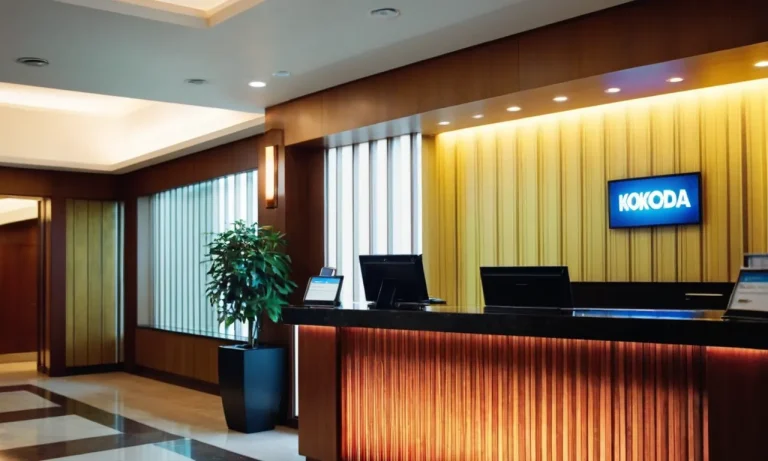Hotel Security Deposit Not Refunded: A Comprehensive Guide
Have you ever experienced the frustration of not receiving your security deposit back from a hotel, despite leaving the room in pristine condition? It’s a common issue that many travelers face, and it can leave a sour taste in your mouth after an otherwise enjoyable stay.
If you’re short on time, here’s a quick answer to your question: Hotels may withhold security deposits for various reasons, such as damages to the property, unpaid fees, or violations of their policies. However, if you believe the hotel has wrongfully withheld your deposit, there are steps you can take to dispute the charge and potentially get your money back.
In this comprehensive article, we’ll delve into the reasons why hotels may not refund security deposits, the legal rights of guests, and the steps you can take to increase your chances of getting your deposit back. We’ll also explore preventive measures to avoid such situations in the future.
Understanding Hotel Security Deposits
What is a Hotel Security Deposit?
A hotel security deposit, also known as an incidental deposit or damage deposit, is a sum of money that hotels require guests to pay upfront to cover any potential damages, missing items, or unpaid expenses during their stay.
It serves as a financial guarantee that guests will adhere to the hotel’s policies and take good care of the property.
The deposit amount can vary widely, ranging from $50 to $500 or more, depending on the hotel’s policies and the room rate.
While the security deposit is typically refundable if no issues arise, hotels may withhold all or a portion of it to cover costs associated with damages, excessive cleaning, smoking in non-smoking rooms, lost room keys, unpaid room service charges, or other violations of the hotel’s rules.

Common Reasons for Withholding Security Deposits
- Damages to the room or hotel property: Hotels may withhold the deposit to cover the cost of repairing or replacing damaged items, such as furniture, walls, carpets, or electronics.
- Excessive cleaning fees: If guests leave the room in an excessively messy or unsanitary condition, hotels may deduct cleaning fees from the deposit.
- Smoking violations: Many hotels have strict no-smoking policies, and guests who smoke in non-smoking rooms may face fines deducted from their security deposit.
- Lost or unreturned items: Hotels may charge for lost or unreturned items, such as room keys, towels, or robes, by deducting the cost from the security deposit.
- Unpaid charges: Any unpaid charges for services like room service, minibar items, or parking fees may be deducted from the security deposit.
Hotel Policies and Guest Responsibilities
It’s crucial for guests to thoroughly review and understand the hotel’s policies regarding security deposits before their stay. Hotels are typically required to disclose their policies, including the deposit amount, reasons for withholding the deposit, and the process for refunds or disputes.
Guests should also be aware of their responsibilities, such as properly caring for the room, adhering to smoking policies, and settling all charges before checking out.
If a hotel decides to withhold all or part of the security deposit, they should provide a detailed explanation and itemized list of charges to the guest. Guests have the right to dispute any charges they believe are unjustified or excessive.
Many hotels have established procedures for handling disputes, and guests can also seek assistance from consumer protection agencies or consider legal action if necessary.
Legal Rights and Regulations
When it comes to hotel security deposits, both guests and establishments have legal rights and responsibilities governed by state and federal laws. Understanding these regulations is crucial to ensure a fair and transparent process for all parties involved.
State and Federal Laws Governing Security Deposits
Most states have specific laws regulating the handling of security deposits for residential and commercial properties, including hotels. These laws typically outline the maximum amount a hotel can charge, the time frame for returning the deposit, and the conditions under which the deposit can be withheld or deducted.
Additionally, the Federal Trade Commission (FTC) provides guidelines on unfair or deceptive practices related to security deposits, ensuring that hotels disclose all relevant information to guests upfront. It emphasizes that hotels must clearly explain the deposit policies, including the conditions under which the deposit may be withheld or deducted.
Consumer Protection Laws and Hotel Responsibilities
Consumer protection laws play a crucial role in safeguarding guests’ rights when it comes to security deposits. These laws require hotels to handle deposits in a fair and transparent manner, providing clear documentation and explanations for any deductions or withholdings.
Hotels have a legal obligation to refund security deposits within a reasonable timeframe after a guest’s departure, provided there are no valid claims for damages or additional charges. Failure to do so can result in penalties, fines, or even legal action against the hotel.
For instance, in Nevada, hotels are required to refund security deposits within 30 days, and failure to do so can result in penalties of up to twice the deposit amount (Nevada Revised Statutes 118A.243).

Statute of Limitations for Deposit Refund Claims
It’s important to note that there is a statute of limitations for filing claims related to unreturned or improperly withheld security deposits. This time frame varies from state to state, ranging from one to six years in most cases.
For example, in California, the statute of limitations for security deposit claims is four years. Guests should be aware of these time limits and act promptly if they believe their security deposit has been improperly handled.
Disputing a Withheld Security Deposit
If your security deposit has been unfairly withheld by a hotel, it’s crucial to take prompt action. Failing to dispute the charge could result in losing your hard-earned money. Here’s a comprehensive guide to help you navigate the process effectively.
Gathering Evidence and Documentation
The first step in disputing a withheld security deposit is to gather all relevant evidence and documentation. This includes:
- Photographs or videos of the room condition upon check-in and check-out
- Copies of any written communication with the hotel staff
- Receipts or invoices related to your stay
- A copy of the hotel’s policies regarding security deposits
Having these documents on hand will strengthen your case and provide credible proof of the room’s condition.
Communicating with the Hotel Management
Once you have your evidence ready, it’s time to initiate communication with the hotel management. Start by sending a polite yet firm letter or email outlining your dispute and providing supporting documentation. Be sure to include the following details:
- Your name, reservation number, and dates of stay
- A clear explanation of why you believe the security deposit should be refunded
- Copies of the evidence you’ve gathered
- A request for a prompt resolution and a deadline for a response
If the hotel management fails to respond or provides an unsatisfactory resolution, don’t give up. Escalate the issue to higher authorities within the hotel’s corporate structure or consider contacting a consumer protection agency like the Consumer Financial Protection Bureau.
Escalating the Issue to Higher Authorities
If your initial attempts to resolve the issue with the hotel management are unsuccessful, it may be time to escalate the matter to higher authorities. Here are some steps you can take:
- Contact the hotel’s corporate office or regional manager and provide them with a detailed account of your dispute, including all supporting documentation.
- File a complaint with the Better Business Bureau or your local consumer protection agency.
- Consider seeking legal counsel, especially if the amount in question is substantial. An attorney can help you navigate the legal process and protect your rights as a consumer.
Remember, persistence and a well-documented case are key to successfully disputing a withheld security deposit. Don’t hesitate to escalate the issue if the hotel fails to provide a satisfactory resolution. With patience and determination, you can increase your chances of getting your hard-earned money back.
Bonus Tip: Stay calm and professional throughout the process. Resorting to aggressive or threatening behavior could undermine your case and harm your chances of a successful resolution.
Preventive Measures and Best Practices
Thoroughly Inspecting the Room Upon Check-In and Check-Out
One of the most effective preventive measures to avoid disputes over hotel security deposits is to thoroughly inspect the room upon check-in and check-out. Upon arrival, take the time to meticulously examine every corner of the room, including the bathroom, closets, and any furnishings.
Document any pre-existing damages or issues with photos or videos, and immediately report them to the front desk. This proactive approach establishes a record of the room’s condition before your stay, reducing the likelihood of being held responsible for damages you didn’t cause.
Similarly, before checking out, conduct another thorough inspection to ensure no new damages have occurred during your stay.
If you find any issues, notify the hotel staff immediately and request a joint inspection. This diligent approach can help mitigate potential misunderstandings and disputes over the security deposit refund.

Understanding Hotel Policies and Guest Responsibilities
It’s crucial to familiarize yourself with the hotel’s policies regarding security deposits, damages, and guest responsibilities. Most reputable hotels provide this information in their terms and conditions or on their websites.
Take the time to read and understand these policies before booking your stay. Pay special attention to clauses that outline what constitutes damage, the process for reporting issues, and the timeline for security deposit refunds.
Additionally, be mindful of your responsibilities as a guest. Treat the room and its furnishings with care, and avoid engaging in activities that could potentially cause damage.
If an accident does occur, promptly report it to the hotel staff to mitigate any further issues and demonstrate good faith.
Considering Travel Insurance or Credit Card Protection
Investing in travel insurance or utilizing credit card protection can provide an additional layer of security and peace of mind. Many travel insurance policies offer coverage for accidental damages or theft at hotels, potentially reimbursing you for any deductions made from your security deposit.
Similarly, certain credit cards offer built-in protection against hotel damages, allowing you to dispute any unfair charges or deductions from your security deposit.
Before your trip, research and compare different travel insurance options or credit card benefits to find the best coverage for your needs. Be sure to read the fine print and understand the terms and conditions, as well as any exclusions or limitations.
By following these preventive measures and best practices, you can significantly reduce the risk of encountering issues with your hotel security deposit not being refunded. Stay vigilant, informed, and proactive throughout your stay to ensure a hassle-free and enjoyable travel experience.
Alternative Dispute Resolution Methods
If your hotel security deposit has not been refunded despite your best efforts, don’t worry – there are alternative dispute resolution methods available to help you get your money back. These methods offer a more cost-effective and efficient way to resolve conflicts compared to traditional litigation.
Here are some options to consider:
Small Claims Court
Small claims court is a relatively inexpensive and straightforward option for resolving disputes involving small amounts of money, such as a hotel security deposit. The process is designed to be user-friendly, and you can often represent yourself without the need for a lawyer.
According to statistics from the US Courts, small claims cases make up a significant portion of civil cases filed each year, with over 500,000 cases filed in 2021 alone. However, it’s important to note that there are limits on the amount you can claim in small claims court, which vary by state.
For example, in California, the maximum amount you can claim is $10,000, while in New York, it’s $5,000. Before pursuing this option, make sure your claim falls within the allowable limits.
Mediation and Arbitration
Mediation and arbitration are popular alternative dispute resolution methods that can help you resolve your hotel security deposit dispute without going to court.
In mediation, a neutral third party (the mediator) facilitates negotiations between you and the hotel, with the goal of reaching a mutually agreeable solution. Mediation is often faster and less expensive than litigation, and it allows both parties to maintain control over the outcome.
Arbitration, on the other hand, involves a neutral third party (the arbitrator) who hears arguments from both sides and makes a legally binding decision. Arbitration can be more formal than mediation, but it’s still generally faster and less costly than going to court.

Online Dispute Resolution Platforms
In today’s digital age, online dispute resolution platforms have emerged as a convenient and accessible option for resolving conflicts like hotel security deposit disputes.
These platforms use technology to facilitate negotiations, mediation, or arbitration between parties, often through secure online portals or video conferencing. Some popular online dispute resolution platforms include ResolveNow, Fairway Resolution, and Smartsettle.
One of the advantages of online dispute resolution is its affordability and convenience. You can participate from the comfort of your own home or office, without the need for travel or time off work. Additionally, many online platforms offer flat-fee pricing, making the cost more predictable and manageable.
Conclusion
Dealing with a withheld hotel security deposit can be a frustrating and time-consuming experience, but it’s important to understand your rights and take appropriate action. By following the steps outlined in this article, you can increase your chances of getting your deposit back or resolving the issue through alternative dispute resolution methods.
Remember, prevention is always better than cure. Thoroughly inspecting the room upon check-in and check-out, understanding hotel policies, and considering travel insurance or credit card protection can help you avoid such situations altogether.
With the right knowledge and approach, you can ensure a hassle-free and enjoyable hotel stay, without worrying about losing your hard-earned money.






